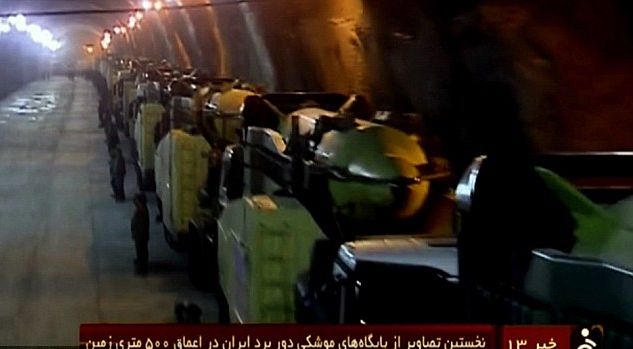Underground Iron Dome Against Hamas' Terror Tunnels
 Israel has started testing a secret new weapon for defeating the tunnel systems which the Palestinian Hamas and Hizballah are busy digging for surprise attacks against Israel. Following Operation Protective Edge in the summer of 2014, a great deal of attention shifted to Israel's need to develop a technological solution to the underground tunnel problem.
Israel has started testing a secret new weapon for defeating the tunnel systems which the Palestinian Hamas and Hizballah are busy digging for surprise attacks against Israel. Following Operation Protective Edge in the summer of 2014, a great deal of attention shifted to Israel's need to develop a technological solution to the underground tunnel problem. Now, according to Foreign Policy magazine, it appears Israel has found that solution. Western sources reported on 11th March 2016, that the new weapon, dubbed the “Underground Iron Dome,” can detect a tunnel, then send in a moving missile ton blow it up. The new weapon is not counter measure only against threat from Gaza and Lebanon but against Iran nukes too.
US intelligence sources disclosed only that new weapon is equipped with seismic sensors to detect underground vibrations and map their location before destroying them. Western experts haven been talking for years about a secret Israeli weapon capable of destroyingn Iran’s Fordo nuclear facility, which is buried deep inside a mountain not farn from the Shiite shrine city of Qom. They suggested that this hypotheticaln weapon could be slipped through the Fordo facility’s vents, thread its way through the underground chambers and take down the illicit enrichment facility. It was discussed again three years ago, when the Israeli Air Force on 23rd Aug. 2013 blew up the Popular Palestinian Front-General Command underground facility at Al-Naama on the South Lebanese coast, 15 km south of Beirut. (Source: DEBKAfile )
The new threat to Israel that appeared in the summer of 2014,n Operation Protective Edge was a network of terror tunnels. Now, Israel Hayom reports, Israel has built its own network of defense tunnels along the Gaza border, with the cooperation of the United States. The US government is set to invest $120 million in developing and manufacturing the "Israeli invention" for detecting and identifying tunnels, in collaboration with the Ministry of Defense, following Congress' approval of the budget transfer. Israel is set to invest a similar amount. For its investment U.S. will receive prototypes, access to test sites, and rights to any intellectual property. Military officials estimated the costs of setting up an advanced tunnel barrier at about 2.8 billion shekels ($710 million). 
- Iran keeps its ballistic missiles in underground bunkers
The goal, U.S. Defense Department spokesman Christopher Sherwood told Foreign Policy, “is to establish anti-tunnel capabilities to detect, map, and neutralize underground tunnels that threaten the U.S. or Israel…”The US is in need of such a system on its
Mexico border and with the Americans in the picture, there is a chance that the project here will start to make progress. The injection of American money and technology will shorten the process and the system will be upgraded, meaning that it will be deployed more quickly. (Source: Israel Hayom )
Among the Israeli companies working on the tunnel-detection project are Elbit Systems and Rafael Advanced Defense Systems,
both of which developed the Iron Dome.
Collapsing tunnels
According Arutz Sheva a Hamas “field commander” [Abd al-Salah al-Butnaji from The Izz al-Din al-Qassam Brigades, Hamas’ armed wing] died 14th March 2016 in a “tunnel accident” in Gaza.
A gas pipe running through a tunnel under the Gazan town of Rafah exploded, wounding some 60-70 people, and killing 2, according to The Jewish Press based on Egyptian sources. According to Al Bawab News, some 50 smuggling tunnels were uncovered due to the explosion. 60 homes in Rafah have been evacuated due to the explosion. There’s no indication at this point as to what caused the gas pipe to leak and explode.
A terror tunnel under the Gazan town of Khan Younis collapsed on 19th March 2016; three Hamas terrorists have been wounded and five others are still missing underground. This is the 10th or 11th terror tunnel to collapse since December 2015.
(Source: The Jewish Press )
On Egypt-Gaza border the Egyptian military vehicles are transferring Mediterranean Sea water to the Rafah border, to fill a newly-built crude canal, flooding and destroying the tunnels connecting Egypt and Gaza. While it is generally believed that this year’s unusually heavy rainfall and flooding by Egyptian army are the main reason for the collapses on Gaza-Israel border, there is growing speculation that an Israeli secret anti-tunnel weapon is at work underground.
Egypt, historically the Palestinians' major backer, has brokered several truces between Israel and Gaza factions and tried to heal past rifts between rival Palestinian factions. But Egypt has intensified a blockade of Gaza by largely sealing the border since 2013, citing precarious security conditions in the neighboring Sinai Peninsula where Islamist militants have launched many
deadly strikes on Egyptian soldiers. Recently Egypt accused Hamas of involvement in last year's assassination of Public Prosecutor Hisham Barakat. (More in Hamas’ Relations With Egypt Worsened )
deadly strikes on Egyptian soldiers. Recently Egypt accused Hamas of involvement in last year's assassination of Public Prosecutor Hisham Barakat. (More in Hamas’ Relations With Egypt Worsened )
Robots in anti-tunnel campaign
 As part of Israel’s anti-tunnel campaign the IDF's earlier recruit was a versatile little Foster-Miller military robot Talon 4 which proved he can handle himself on the battlefields of Iraq and was drafted for use in the dangerous tunnels on the Gaza Strip border instead of soldiers to reduce risks to troops.
As part of Israel’s anti-tunnel campaign the IDF's earlier recruit was a versatile little Foster-Miller military robot Talon 4 which proved he can handle himself on the battlefields of Iraq and was drafted for use in the dangerous tunnels on the Gaza Strip border instead of soldiers to reduce risks to troops.
 As part of Israel’s anti-tunnel campaign the IDF's earlier recruit was a versatile little Foster-Miller military robot Talon 4 which proved he can handle himself on the battlefields of Iraq and was drafted for use in the dangerous tunnels on the Gaza Strip border instead of soldiers to reduce risks to troops.
As part of Israel’s anti-tunnel campaign the IDF's earlier recruit was a versatile little Foster-Miller military robot Talon 4 which proved he can handle himself on the battlefields of Iraq and was drafted for use in the dangerous tunnels on the Gaza Strip border instead of soldiers to reduce risks to troops.
In addition Israel debuted the Micro Tactical Ground Robot (MTGR) built by Roboteam, a locally developed micro robot, to explore the labyrinth of tunnels and concealed shafts supporting subterranean arms depots, command posts and cross-border attacksn from Gaza. After competing for more than two years with America's leading robot providers, an Israeli newcomer to the industry through its US subsidiary has snagged a $25 million US Air Force contract to provide its man-portable, stair-climbing, battle-tested system in support of Explosive Ordnance Disposal (EOD) missions. MTGR weighs less than 20 pounds and is built to clear obstacles, climb 8-inch stairs and maneuver in tight, dangerous terrain. Its five onboard cameras, internal microphone and infrared laser points generate intelligence and targeting data 360 degrees around the vehicle. (Defense News)
The bottom line
One reason which angers Palestinians is a sc. siege on Gaza, which prevents the building process of the new homes since last
Gaza conflict in 2014. As a matter of fact Palestinians should be angry with Hamas for rebuilding the tunnels instead of homes. In fact, since the cease-fire between Israel and the militant Islamist group Hamas, more than 3 million tons of construction material have entered Gaza through Israel’s Kerem Shalom border crossing, according to Israeli figures. Big part of construction materials as well of other donations is used for building terror and smuggling tunnels. (More in Instead of Gaza’s Reconstruction Donor Aid Finances Terrorism And Corruption )
Gaza conflict in 2014. As a matter of fact Palestinians should be angry with Hamas for rebuilding the tunnels instead of homes. In fact, since the cease-fire between Israel and the militant Islamist group Hamas, more than 3 million tons of construction material have entered Gaza through Israel’s Kerem Shalom border crossing, according to Israeli figures. Big part of construction materials as well of other donations is used for building terror and smuggling tunnels. (More in Instead of Gaza’s Reconstruction Donor Aid Finances Terrorism And Corruption )
Hamas is in its own race against time. From the organization's perspective, it's already finished its preparations for a military entanglement with Israel and is now grappling with timing. And thisn timing will be greatly affected by the pace of the Israeli project's progress. Hamas is preparing a surprise attack. If they are led to believe for a moment that Israel has a solution that will bring its tunnels out into the open, it will push them to bring their attack forward. The IDF is already making estimates around possibility that the collision is likely to take place within a few months. A series of gestures and events over the past few weeks attest to the building concern that the next round of fighting between Israel and Hamas will arrive sooner rather than later. It started with reports, specifically in Israel, on the certainty that Hamas' tunnels have already entered Israeli territory.
Both Palestinian Hamas and the pro-Iranian Hizballah are working overtime on tunnels for sneaking terrorists and commando
fighters into Israel to attack IDF posts and civilian locations. During Israel’s last counter-terror operation in the Gaza Strip, Hamas staged a deadly tunnel attack on the Israel side of the border and is planning repeats. Hizballah is training commando units for underground surprise incursions to capture parts of Galilee in northern Israel. Israel still appears unable to completely counter Hamas’s subterranean advantage. And if the development of the Underground Iron Dome is any indication, it could be several years before Israel is able to employ an effective anti-tunnel system.
Both Palestinian Hamas and the pro-Iranian Hizballah are working overtime on tunnels for sneaking terrorists and commando
fighters into Israel to attack IDF posts and civilian locations. During Israel’s last counter-terror operation in the Gaza Strip, Hamas staged a deadly tunnel attack on the Israel side of the border and is planning repeats. Hizballah is training commando units for underground surprise incursions to capture parts of Galilee in northern Israel. Israel still appears unable to completely counter Hamas’s subterranean advantage. And if the development of the Underground Iron Dome is any indication, it could be several years before Israel is able to employ an effective anti-tunnel system.
An injection of US cash into Israel's anti-tunnel technology will speed up its development. But the increased activity on the Israeli side is liable to provoke Hamas into jumping the gun and launching an early surprise attack.

Some related articles:
Comments